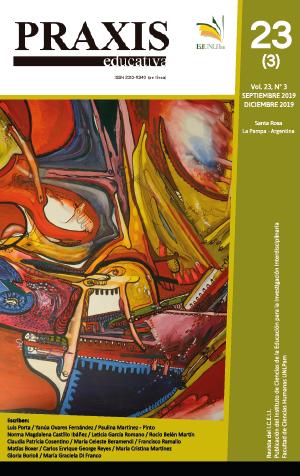Questioning the word. Oral communication and learning in the Universidad Nacional de Córdoba
DOI:
https://doi.org/10.19137/praxiseducativa-2019-230302Keywords:
academic discourse, university, education, oral communication, conversationAbstract
Centered on oral communication in the Academy, the paper sets a dialogue between two voices: on the one hand, the practises and concerns of the students of a workshop on communicational abilities offered in the National University of Cordoba in 2018; and, on the other hand, contributions from language sciences (Barthes, 2003; Todorov, 2008; Van Dijk, 1983) and philosophy (Foucault, 1996; Skliar, 2015).
Which are the challenges on oral academic communication for those who teach and learn? How do students learn when teachers give their lessons and how do they take the word in order to say their knowledge? From those starting points and in a flexible essay, the papertext unfolds reflections on philosophical, psychological, and socio-anthropological concepts --social control, power and self-care - as well as representations of technical concepts —conceptual precision, the adjustment to the communication situation, the discipline lexical realm, and the macro-structure —in order to consider some social and didactic implications of oral communication in the university environment.
Downloads
References
Barthes, R. (2003). Variaciones sobre la escritura. Buenos Aires: Paidós.
Bidiña, A. yZerillo, A. (Coords.). (2013). La lectura y la escritura en el ingreso a la universidad. Experiencias con alumnos y docentes de la UNLaM. San Justo: Universidad Nacional de La Matanza.
Bombini, G. yLabeur, P. (Coord.). (2017). Leer y escribir en zonas de pasaje. Buenos Aires: Biblos.
Bourdieu, P. (1985). ¿Qué significa hablar? Economía de los intercambios lingüísticos. Madrid: Akal.
Cárdenas, V.(Coord.). (2007). La puesta en palabras. Reformulación oral y escrita en estudiantes universitarios de primer año. Salta: Editorial de la Universidad Nacional de Salta.
Corominas, J. (1976). Breve diccionario etimológico de la lengua castellana. Madrid: Gredos.
Foucault, M. (1996). La hermenéutica del sujeto. La Plata: Altamira.
Navarro, F. (2014). Manual de escritura para carreras de humanidades. Buenos Aires: Editorial de la Facultad de Filosofía y Letras, Universidad Nacional de Buenos Aires. Recuperado de: http://biblioteca.cefyl.net/node/29586.
Todorov, T. (2008). La vida en común. Ensayo de antropología general. Buenos Aires: Aguilar, Altea, Taurus, Alfaguara. Van Dijk, T. (1983). La ciencia del texto. Buenos Aires: Paidós.
Downloads
Published
Issue
Section
License
Copyright Notice
Editorial Committee Educational Praxis Magazine:
I hereby declare that I am the author of the article titled (article name), that it is original and my own and that it was not previously published in any other format or medium. I declare to know that the magazine will not charge me any type of fee under any circumstances, nor will I receive any type of monetary compensation If it were accepted for publication in Educational Praxis, I authorize the aforementioned magazine to publish it digitally and to advertise it on its social networks.
If the work is published, I adhere to the Creative Commons license called "Attribution - Non-Commercial Share Alike CC BY-NC-SA", through which it is allowed to copy, reproduce, distribute, publicly communicate the work and generate derivative works, as long as when the original author is cited and acknowledged. This license has been used since September 2018. In 2016 CC BY NC ND 4.0 was adhered to; and in the years 2017 and 2018 (January-August) CC BY NC 4.0.
This CC BY-NC-SA Share Alike license does not, however, permit commercial use of the work. As an author, the journal may establish additional agreements for the non-exclusive distribution of the version of the work published in the journal, it allows me to self-archive the published articles, in their post-print version, in institutional, thematic repositories, personal web pages or any other relevant use. with the recognition of having been first published in this journal.
Educational Praxis adheres to DORA (Declaration on Research Assessment) signed in San Francisco, California, on December 16, 2012, and to the Declaration of Mexico (Joint Declaration LATINDEX - REDALYC - CLACSO - IBICT).















_(1)2.png)


3.png)











_(2).png)






2.jpg)









